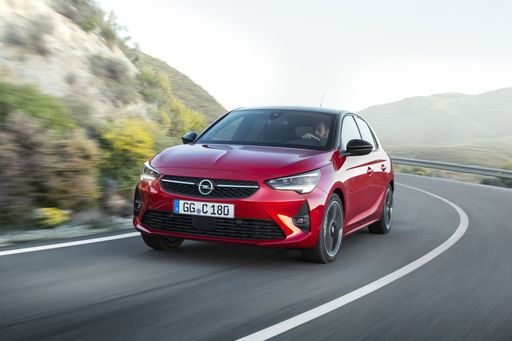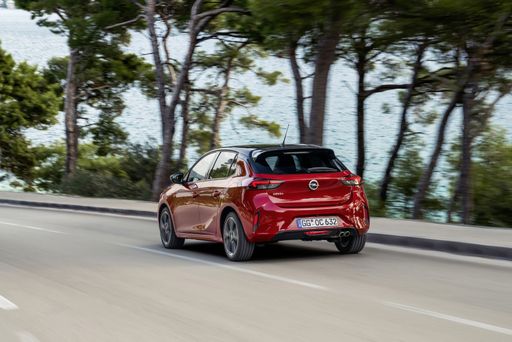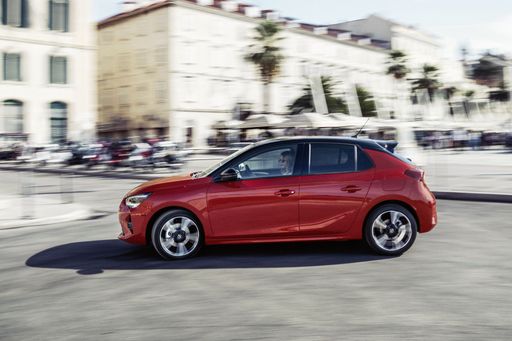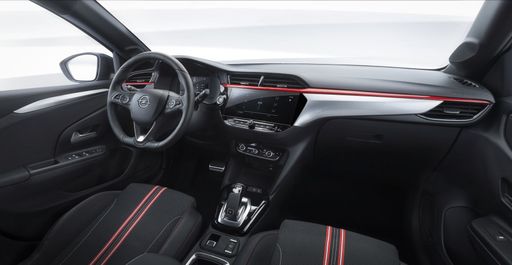Vauxhall Corsa vs Toyota Prius – Performance, range & efficiency compared
Both models have their strengths – but which one suits you more?
Compare performance, efficiency, price and space directly: Vauxhall Corsa or Toyota Prius?
Costs and Efficiency:
When it comes to price and running costs, the biggest differences usually appear. This is often where you see which car fits your budget better in the long run.
Vauxhall Corsa has a significantly advantage in terms of price – it starts at 19400 £, while the Toyota Prius costs 39400 £. That’s a price difference of around 19980 £.
Fuel consumption also shows a difference: Toyota Prius manages with 0.50 L and is therefore clearly more efficient than the Vauxhall Corsa with 4.60 L. The difference is about 4.10 L per 100 km.
As for range, the Vauxhall Corsa performs clearly better – achieving up to 424 km, about 338 km more than the Toyota Prius.
Engine and Performance:
Under the bonnet, it becomes clear which model is tuned for sportiness and which one takes the lead when you hit the accelerator.
When it comes to engine power, the Toyota Prius has a distinct edge – offering 223 HP compared to 156 HP. That’s roughly 67 HP more horsepower.
In acceleration from 0 to 100 km/h, the Toyota Prius is somewhat quicker – completing the sprint in 6.80 s, while the Vauxhall Corsa takes 7.90 s. That’s about 1.10 s faster.
In terms of top speed, the Vauxhall Corsa performs somewhat better – reaching 210 km/h, while the Toyota Prius tops out at 177 km/h. The difference is around 33 km/h.
Space and Everyday Use:
Beyond pure performance, interior space and usability matter most in daily life. This is where you see which car is more practical and versatile.
Both vehicles offer seating for 5 people.
In curb weight, Vauxhall Corsa is distinct lighter – 1175 kg compared to 1620 kg. The difference is around 445 kg.
In terms of boot space, the Vauxhall Corsa offers minimal more room – 309 L compared to 284 L. That’s a difference of about 25 L.
When it comes to payload, Vauxhall Corsa slightly takes the win – 445 kg compared to 375 kg. That’s a difference of about 70 kg.
Who comes out on top?
Overall, the Toyota Prius shows itself to be leaves the rival little chance and secures the title of DriveDuel Champion.
It convinces with the more balanced overall package and proves to be the more versatile choice for everyday use.
 @ Toyota Motor Corporation
@ Toyota Motor Corporation
Toyota Prius
Vauxhall Corsa
The Opel Corsa continues to be a strong contender in the compact car market, offering a blend of stylish design and practicality. Its interior is thoughtfully laid out, providing drivers with a comfortable and engaging experience, while the technology on offer ensures connectivity and ease of use. With its efficient performance and reputation for reliability, the Corsa remains a popular choice for urban and suburban motoring needs.
details @ Opel / Stellantis Media
@ Opel / Stellantis Media
 @ Opel / Stellantis Media
@ Opel / Stellantis Media
 @ Opel / Stellantis Media
@ Opel / Stellantis Media
 @ Opel / Stellantis Media
@ Opel / Stellantis Media
Toyota Prius
The Toyota Prius stands as a pioneer in the realm of hybrid vehicles, offering an eco-friendly driving alternative with its innovative technology. Its aerodynamic design and comfortable interior make it a practical choice for those looking to reduce their carbon footprint without sacrificing style. Additionally, the Prius boasts a reputation for reliability and efficiency, contributing to its lasting popularity among environmentally conscious drivers.
details @ Toyota Motor Corporation
@ Toyota Motor Corporation
 @ Toyota Motor Corporation
@ Toyota Motor Corporation
 @ Toyota Motor Corporation
@ Toyota Motor Corporation
 @ Toyota Motor Corporation
@ Toyota Motor Corporation
 @ Opel / Stellantis Media
@ Opel / Stellantis Media
|
 @ Toyota Motor Corporation
@ Toyota Motor Corporation
|
|
|
|
Costs and Consumption |
|
|---|---|
|
Price
19400 - 28600 £
|
Price
39400 - 45800 £
|
|
Consumption L/100km
4.6 - 5.3 L
|
Consumption L/100km
0.5 - 0.7 L
|
|
Consumption kWh/100km
14.4 - 16.2 kWh
|
Consumption kWh/100km
-
|
|
Electric Range
347 - 424 km
|
Electric Range
72 - 86 km
|
|
Battery Capacity
46 - 51 kWh
|
Battery Capacity
-
|
|
co2
0 - 120 g/km
|
co2
12 - 17 g/km
|
|
Fuel tank capacity
44 L
|
Fuel tank capacity
40 L
|
Dimensions and Body |
|
|---|---|
|
Body Type
Hatchback
|
Body Type
Hatchback
|
|
Seats
5
|
Seats
5
|
|
Doors
5
|
Doors
5
|
|
Curb weight
1175 - 1544 kg
|
Curb weight
1620 - 1630 kg
|
|
Trunk capacity
267 - 309 L
|
Trunk capacity
284 L
|
|
Length
4061 mm
|
Length
4599 mm
|
|
Width
1765 mm
|
Width
1782 mm
|
|
Height
1435 mm
|
Height
1470 mm
|
|
Max trunk capacity
1004 - 1081 L
|
Max trunk capacity
-
|
|
Payload
376 - 445 kg
|
Payload
365 - 375 kg
|
Engine and Performance |
|
|---|---|
|
Engine Type
Petrol, Electric, Petrol MHEV
|
Engine Type
Plugin Hybrid
|
|
Transmission
Manuel, Automatic
|
Transmission
Automatic
|
|
Transmission Detail
Manual Gearbox, Dual-Clutch Automatic, Reduction Gearbox
|
Transmission Detail
CVT
|
|
Drive Type
Front-Wheel Drive
|
Drive Type
Front-Wheel Drive
|
|
Power HP
100 - 156 HP
|
Power HP
223 HP
|
|
Acceleration 0-100km/h
7.9 - 9.9 s
|
Acceleration 0-100km/h
6.80 s
|
|
Max Speed
150 - 210 km/h
|
Max Speed
177 km/h
|
|
Torque
205 - 260 Nm
|
Torque
-
|
|
Number of Cylinders
3
|
Number of Cylinders
4
|
|
Power kW
74 - 115 kW
|
Power kW
164 kW
|
|
Engine capacity
1199 cm3
|
Engine capacity
1998 cm3
|
General |
|
|---|---|
|
Model Year
2023 - 2025
|
Model Year
2023
|
|
CO2 Efficiency Class
D, A, C
|
CO2 Efficiency Class
B
|
|
Brand
Vauxhall
|
Brand
Toyota
|
What drive types are available for the Vauxhall Corsa?
The Vauxhall Corsa is offered with Front-Wheel Drive.
The prices and data displayed are estimates based on German list prices and may vary by country. This information is not legally binding.
